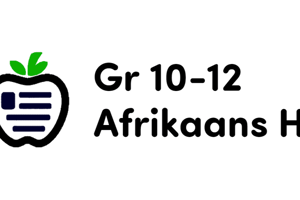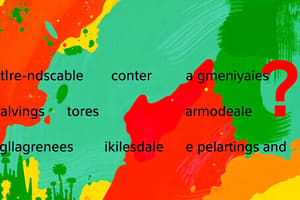Podcast
Questions and Answers
What is a key focus of the Afrikaans curriculum?
What is a key focus of the Afrikaans curriculum?
- Study of Afrikaans literature exclusively
- Mastery of advanced academic vocabulary
- Comprehension of historical texts only
- Development of reading, writing, listening, and speaking skills (correct)
Which skill involves presenting ideas clearly and coherently?
Which skill involves presenting ideas clearly and coherently?
- Listening Skills
- Writing Skills
- Reading Skills
- Speaking Skills (correct)
What is crucial for developing reading skills in Afrikaans?
What is crucial for developing reading skills in Afrikaans?
- Writing summaries without context
- Memorizing vocabulary lists
- Analyzing texts for characters, themes, and settings (correct)
- Listening to audio recordings exclusively
What type of texts should be composed in writing skills development?
What type of texts should be composed in writing skills development?
What is emphasized in vocabulary development?
What is emphasized in vocabulary development?
Which grammar aspect is included in the curriculum focus?
Which grammar aspect is included in the curriculum focus?
How are students assessed on their comprehension skills?
How are students assessed on their comprehension skills?
Which cultural aspect is included in the curriculum?
Which cultural aspect is included in the curriculum?
Watter aspek van luistervaardighede beklemtoon die gebruik van klankmateriaal?
Watter aspek van luistervaardighede beklemtoon die gebruik van klankmateriaal?
Wat is 'n aktiwiteit wat gebruik word om spraakvaardighede te ontwikkel?
Wat is 'n aktiwiteit wat gebruik word om spraakvaardighede te ontwikkel?
Watter tipe teks sal 'n student blootgestel word aan die leesvaardighede?
Watter tipe teks sal 'n student blootgestel word aan die leesvaardighede?
Watter faktor is 'n sleutelonderdeel van grammatika in die kurrikulum?
Watter faktor is 'n sleutelonderdeel van grammatika in die kurrikulum?
Wat is een van die assesseringsmetodes wat gebruik word?
Wat is een van die assesseringsmetodes wat gebruik word?
Watter strategie kan help om woordeskat uit te brei?
Watter strategie kan help om woordeskat uit te brei?
Wat sluit in die studie van letterkunde in die kurrikulum?
Wat sluit in die studie van letterkunde in die kurrikulum?
Wat word aanbeveel om skryfvaardighede te verbeter?
Wat word aanbeveel om skryfvaardighede te verbeter?
Study Notes
Curriculum Overview
- Focus on developing reading, writing, listening, and speaking skills in Afrikaans.
- Emphasizes comprehension and communication in various contexts.
Key Language Skills
-
Listening Skills
- Understand spoken Afrikaans in conversations and texts.
- Identify main ideas, details, and tone in audio material.
-
Speaking Skills
- Engage in conversations using appropriate vocabulary and grammar.
- Present ideas clearly and coherently.
- Practice pronunciation and intonation.
-
Reading Skills
- Develop comprehension through various texts (stories, poems, articles).
- Analyze characters, themes, and settings in literature.
- Infer meaning from context and summarize passages.
-
Writing Skills
- Compose different types of texts (narrative, descriptive, informative).
- Focus on grammar, spelling, punctuation, and structure.
- Practice writing coherent paragraphs and essays.
Vocabulary Development
- Expand vocabulary through themed word lists and contextual learning.
- Use dictionaries and thesauruses to understand word meanings and synonyms.
Grammar Focus
- Master basic grammar rules, including:
- Nouns, verbs, adjectives, and adverbs.
- Sentence structure: simple and complex sentences.
- Tenses: present, past, and future forms.
Cultural Context
- Explore cultural aspects of Afrikaans-speaking communities.
- Discuss traditions, history, and contributions to South African society.
Assessment Methods
- Regular quizzes and tests on vocabulary, grammar, and comprehension.
- Oral presentations and group discussions to evaluate speaking skills.
- Written assignments to assess writing proficiency and creativity.
Study Tips
- Practice speaking with peers or language partners.
- Read Afrikaans literature and watch Afrikaans films for immersion.
- Use flashcards for vocabulary retention.
- Review grammar rules frequently and apply them in writing exercises.
Curriculum Overview
- Focus on enhancing core language skills: reading, writing, listening, and speaking in Afrikaans.
- Aims to improve comprehension and effective communication in diverse contexts.
Key Language Skills
-
Listening Skills
- Understand woven conversations and texts in Afrikaans.
- Identify key concepts, supporting details, and emotional undertones in audio material.
-
Speaking Skills
- Participate actively in conversations using suitable vocabulary and grammatical structures.
- Present ideas with clarity and coherence, paying attention to pronunciation and intonation.
-
Reading Skills
- Enhance comprehension through a variety of texts, including stories, poems, and articles.
- Analyze elements such as characters, themes, and settings within literary works.
- Practice inferring meanings from context and summarizing textual information effectively.
-
Writing Skills
- Create diverse text types, including narratives, descriptions, and informative pieces.
- Prioritize grammar, spelling, punctuation, and coherent structure.
- Develop skills to write coherent paragraphs and structured essays.
Vocabulary Development
- Broaden vocabulary through themed lists and context-based learning strategies.
- Employ dictionaries and thesauruses for grasping word meanings and finding synonyms.
Grammar Focus
- Acquire fundamental grammar knowledge, focusing on:
- Major parts of speech: nouns, verbs, adjectives, and adverbs.
- Sentence structure understanding: differentiating between simple and complex sentences.
- Mastery of verb tenses: present, past, and future forms.
Cultural Context
- Investigate the cultural nuances of Afrikaans-speaking communities.
- Engage in discussions about traditions, historical narratives, and the impact of Afrikaans culture on South African society.
Assessment Methods
- Conduct regular quizzes and tests assessing vocabulary, grammar, and reading comprehension.
- Facilitate oral presentations and group discussions to evaluate and enhance speaking abilities.
- Assign written tasks to measure writing proficiency and creative expression.
Study Tips
- Engage in speaking practice with peers and language partners for better fluency.
- Consume Afrikaans literature and films to enhance immersion in the language.
- Use flashcards as effective tools for vocabulary retention and recall.
- Routinely review grammar rules and incorporate them into writing exercises for practical application.
Curriculum Overview
- Develops language skills in Afrikaans across listening, speaking, reading, and writing.
- Encourages appreciation and understanding of Afrikaans literature and culture.
Key Components
-
Listening Skills
- Comprehend spoken Afrikaans via stories, dialogues, and discussions.
- Utilize audio materials like songs and podcasts to enhance listening abilities.
-
Speaking Skills
- Engage in role-plays, presentations, and conversations to practice speaking.
- Focus on pronunciation, appropriate vocabulary usage, and achieving fluency.
-
Reading Skills
- Read diverse texts including fiction, non-fiction, poetry, and newspapers.
- Develop skills in comprehension, summarizing information, and interpreting texts.
-
Writing Skills
- Compose short essays, narratives, and descriptive pieces for practice.
- Learn about writing structure, grammar, punctuation, and vocabulary use.
Language Structure
-
Grammar
- Understand parts of speech including nouns, verbs, and adjectives.
- Learn about sentence construction and subject-verb agreement.
-
Vocabulary
- Study thematic vocabulary groups such as family, school, and nature.
- Use strategies for expanding vocabulary, including context clues and word roots.
Literature
- Introduce Afrikaans authors and poets through selected texts.
- Analyze texts for themes, character development, and literary devices.
- Discuss the cultural significance and historical context of literary works.
Assessment Methods
- Implement continuous assessment via class participation and assignments.
- Conduct formal evaluations through tests and projects.
- Use oral presentations to assess speaking proficiency.
Study Tips
- Engage in regular practice of speaking and listening skills to enhance fluency.
- Read a variety of Afrikaans texts regularly to boost comprehension skills.
- Write daily to improve writing proficiency and reinforce grammar concepts.
- Participate in discussions with peers to build confidence in using the language.
Studying That Suits You
Use AI to generate personalized quizzes and flashcards to suit your learning preferences.
Description
This quiz covers essential language skills in Afrikaans, focusing on listening, speaking, reading, and writing. It aims to enhance comprehension and communication abilities across different contexts through various exercises and activities. Evaluate your understanding and proficiency in each area to strengthen your Afrikaans language skills.




